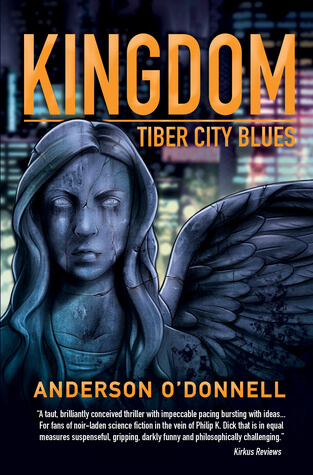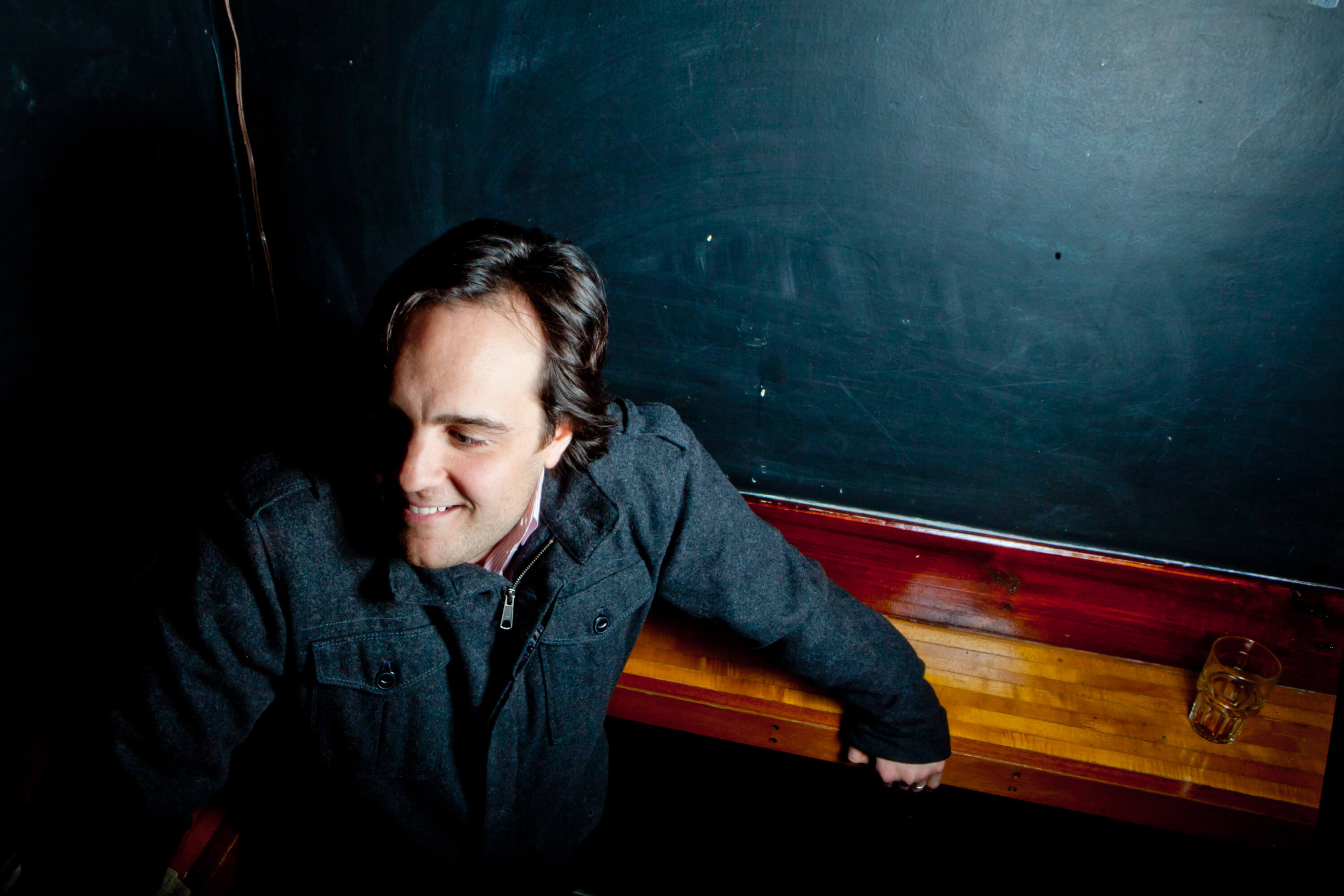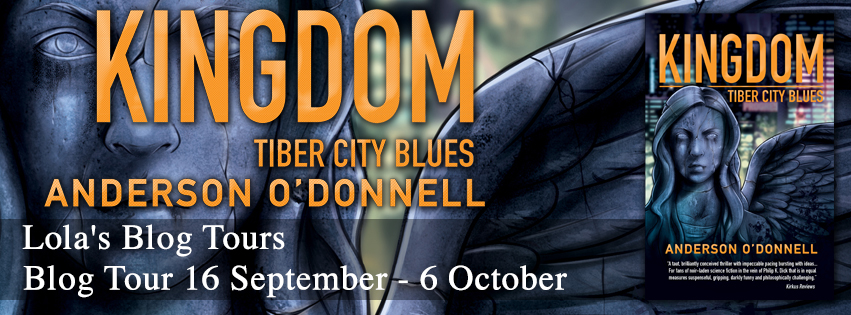

Yesterday I shared my thoughts on Kingdom Tiber City Blues, a novel by Anderson O’Donnell. Kingdom: Tiber City Blues has made it to my list of dystopian novels that will feature in a future article about the themes is dystopia based on the books in the genre I read in 2019. As part of the blog tour, I also got the opportunity to talk to Anderson about his book and writing. Obsessed with dystopian fiction and the Clash, Anderson resides with his wife and three children in Collinsville, CT.
It was wonderful to connect with him! Enjoy the interview, and get some insights about the book, without any spoilers! 🙂
- What was the moment when the idea of the book first came to be? What made you pursue it?
I wrote an earlier version of Kingdom just after I graduated college—just a few years after 9/11. The country seemed to be filled with a strange fear—a communal anxiety that seemed to grip the land. And the new digital landscape exacerbated that fear, driving us apart, and undermining lots of the institutions that, I think ironically, actually helped form our individual identities. I was, like most people in their mid-20s, adrift. There was this world out there—the world of Michael Morrison—that was seductive in its wealth and glamor and privilege. And there was pressure to join that world. And so I think Kingdom: TCB is a response to that sense of fear and anxiety washing across America; it’s my attempt to make sense of the ideas and concepts I studied as a Lit major at a Jesuit college—especially when those ideas crashed headlong into Michael Morrison’s world; and finally, a response to a world where many of the institutions of the West were failing. Those institutions were touchstones of my youth, and the world I knew. What would replace them? It seemed like the primary candidates were things designed to celebrate the ego; to glorify the narcissist. I wanted to take those ideas and create a world that reflected what I saw happening around me—a warning, perhaps, of what could happen if we continued down our present course.
- What has happened to the world to lead to an empire like Morrison’s to flourish?
People stopped paying attention. They lost themselves in their devices, in their media—basically, in their own reflections. Of course, the groundwork for such narcissism has been built over the past century as many traditional, communal-based institutions have given away to solitary or online pursuits. When we stop communicating with our neighbors, with our communities, I think we tend to sink into ourselves, into our media bubbles. Morrison’s empire is an empire built first and foremost around the deification of the individual.
- What kind of research did you have to do for your novel?
I spent a great deal of time researching the scientific aspects of the story. I had an idea of how I wanted to present the science, but I didn’t always know the language/words/concepts to use. And readers can’t lose themselves in the prose if the details aren’t right. So, I worked hard to try and make the science as believable as possible. Even the most fantastic concepts, I think, require a foundation of basic believability.
- In a high-tech world where drones roam the street, religion and spiritually still form an integral part of the society. What was your reasoning behind the Order to be a spiritual entity combating the biotech of Morrison Medical?
I think that regardless of one’s own feelings on organized religion, or theology, most of us would accept the premise that we haven’t seen everything this world has to offer—that there is something more, something else out there. If that’s not the case—if the world is just made of fact and data and nothing more—then I’m not sure what makes human life any more special or unique than say, a robot. There is something special that makes us more than just what our DNA says we are. I don’t know what that special thing is, but every culture has, in some way or another, acknowledge this thing exists and sets humans apart. As such, the Order vs. Morrison battle is representative of the struggle between those who wish to use technology to gain a greater understanding of what exactly makes us human, and those who would use technology to destroy those things that make sure human—usually in return for a tidy profit.
- What advice would you give to someone living in the Tiber City, when Campbell was working with the Order?
To start trying to piece their communities back together. Turn off the electronics, the digital distractions, and have dinner with your neighbor. Get to know them. And hope they don’t try to eat you or sell you into sex slavery. Assuming you clear those hurdles, you might not feel so alone, and maybe you start interacting more with the people around you, restoring trust and nurturing empathy.
- Which city(/cities) is the Tiber City inspired by?
Mostly the American East Coast. A lot of the book was written in NYC and DC—but not the nice parts, not the tourist stuff. So much of the description stems from wandering those cities at night, drifting from subways to random bars. Watching people from the back of taxies. Meeting the wrong people at the wrong places and ending up back at strange gatherings with, well, strangers. You see a lot of weird shit at 2:30 in the morning, and that’s the time when a lot of this material came together.
- Are there any books that you would say influenced and shaped you as a writer?
Absolutely. William Gibson’s “Neuromancer” (and the rest of the sprawl trilogy) was a huge influence. As was the writing/style of Bret Easton Ellis, Jack O’Connell and Phillip K. Dick. Joan Didion was also a huge influence—she, along with Ellis, really nailed the feeling of anxiety and “unsettledness” I felt through my 20s, and frankly, still do. To see how those writers used those feelings was just, and still is, incredible.
- What would you tell your younger self when it comes to writing?
Less partying, more writing. Be more disciplined, because as you get older, finding time to write only gets harder.
** Kingdom: Tiber City Blues is now out in stores so get a copy and let me know what you think! Let’s have a book-discussion! **
Amazon Print

This post is part of Lola’s Blog Tours‘ Blog Tour for Kingdom Tiber City Blues by Anderson O’Donnell. Be sure to check out other blogs about the book and my thoughts on it here.
Cover image: Photo by Alex Knight on Unsplash

Be First to Comment